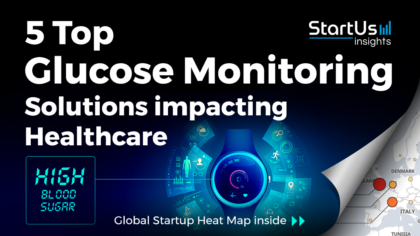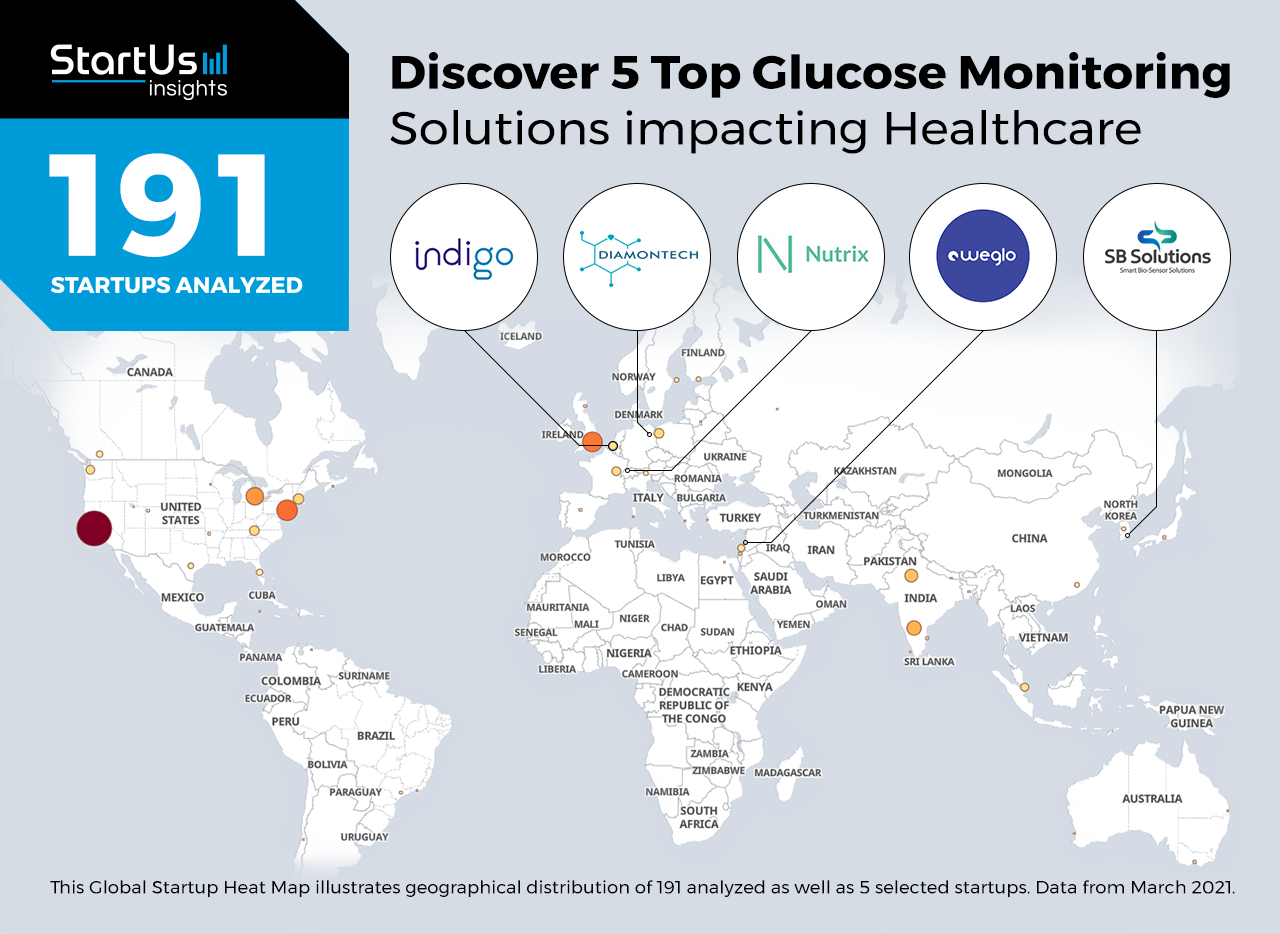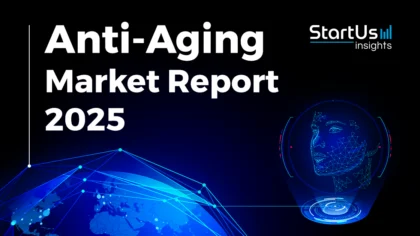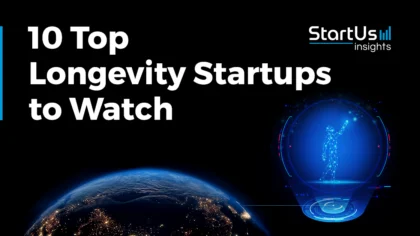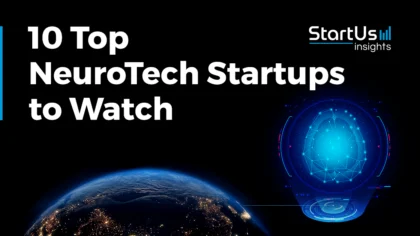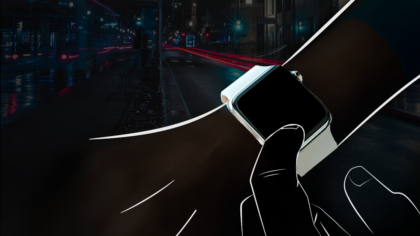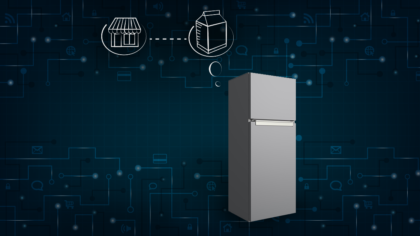Accelerate Productivity in 2025
Reignite Growth Despite the Global Slowdown
Staying ahead of the technology curve means strengthening your competitive advantage. That is why we give you data-driven innovation insights into the healthcare industry. This time, you get to discover 5 hand-picked glucose monitoring solutions.
Global Startup Heat Map highlights 5 Top Glucose Monitoring Solutions out of 191
The insights of this data-driven analysis are derived from the Big Data & Artificial Intelligence-powered StartUs Insights Discovery Platform, covering 1.379.000+ startups & scaleups globally. The platform gives you an exhaustive overview of emerging technologies & relevant startups within a specific field in just a few clicks.
The Global Startup Heat Map below reveals the distribution of the 191 exemplary startups & scaleups we analyzed for this research. Further, it highlights 5 startups developing glucose monitoring solutions that we hand-picked based on criteria such as founding year, location, funding raised, and more. You get to explore the solutions of these 5 startups & scaleups in this report. For insights on the other 186 glucose monitoring solutions, get in touch.
Weglo provides Non-Invasive Glucose Monitoring
Diabetes is among the biggest modern health challenges, affecting a large percentage of the global population. Current methods of measuring glucose levels involve drawing blood and analyzing it. For people who require regular or constant glucose level monitoring, the repeated process of pricking becomes painful. To this end, startups are developing non-invasive solutions for continuous blood glucose level monitoring.
Lebanese startup Weglo develops a smartwatch wearable for non-invasive glucose monitoring. It is less expensive than conventional glucose monitors as it does not require pins, strips, and sensors. The device is up to 96% accurate at detecting glucose shifts in blood. By allowing continuous glucose monitoring, it provides detailed insights into the causes that affect glucose levels.
Nutrix creates a Glucose Nanosensor
Biomarkers help diagnose and detect diseases from biological samples. Glucose biomarkers such as HbA1c are generally screened in blood samples. However, glucose biomarkers are also present in saliva and sweat, providing a more convenient and non-invasive option. Startups are developing sensors that detect the blood glucose level through sweat and saliva as the sample collection process is non-invasive.
Swiss startup Nutrix creates a nanosensor to detect glucose levels in saliva. The sensor uses AI processing and pattern recognition algorithms to analyze the saliva samples for multiple molecules simultaneously. Although glucose is more diluted in saliva than in blood, the sensor uses its high sensitivity to collect measurements. The sensor enables medical device manufacturers to create non-invasive glucose monitoring devices.
Indigo develops a Subdermal Glucose Monitor
Diabetic patients are at risk of stroke, loss of consciousness, cataracts, heart diseases, and other severe conditions. For these reasons, they need to constantly monitor and manage their glucose levels. Startups are developing glucose monitoring sensors that sit under the skin and wirelessly transmit blood glucose data. This later allows users to monitor their glucose levels in real-time and improve their quality of life.
Belgian startup Indigo manufactures a subdermal glucose monitor. Its sensor lasts for up to 2 years in the body and measures glucose and ketone levels. The sensor uses photonic technology to accurately collect biomarker data and sends it to an application for interpretation and monitoring. It also shares the data with healthcare professionals for tailored treatment and tracking progress.
DiaMonTech develops a Portable Glucose Monitoring Device
Current glucose monitoring solutions involve the use of a lancet to draw blood that is placed on a test strip for analysis. The downsides to this method are the discomfort and readings that are affected by a number of factors such as damaged or expired test strips, incorrect placement of strips in readers, and contaminated samples. Startups are using non-invasive glucose measurement devices to improve the overall glucose monitoring process and experience.
German startup DiaMonTech develops non-invasive, portable blood glucose monitoring devices. D-Base, the startup’s portable glucose testing device uses spectroscopy to measure glucose levels on the surface of the skin. D-Pocket is a handheld device that measures the glucose level on the surface of the finger placed on the surface of the device. Lastly, D-Sensor is a blood sugar level detection sensor that is integrable with wearable devices.
SB Solutions creates an Implantable Glucose Sensor
Although implantable glucose sensors were developed several years ago, the technology still has many shortfalls. These include the short operation time of the implanted sensors, loss of function due to degradation and fouling, and delayed measurement in the interstitial fluid layer. MedTech startups are solving the cost and efficiency challenges with implantable sensors. They provide implantable monitors with longer-lasting sensors and better signal processing and transmission capabilities.
Korean startup SB Solutions manufactures an implantable electromagnetic sensor for passive glucose monitoring. The sensor works in 3 separate modes, each with a specific glucose measurement function. Invasive mode measures changes in blood glucose diffused in the interstitial fluid layer at 5-minute intervals. Single-mode extends the area of signal transmission for glucose data collection but has diminished accuracy. Lastly, in the array mode, multiple electromagnetic sensors in parallel to increase the penetration depth.
Discover more Healthcare Startups
The 191 startups developing glucose monitoring solutions, such as the 5 examples highlighted in this report, focus on non-invasive, portable, and implantable solutions, among others. While all of these technologies play a major role in advancing healthcare monitoring, they only represent the tip of the iceberg. To explore more healthcare technologies, simply get in touch to let us look into your areas of interest. For a more general overview, you can download our free Healthcare Innovation Report to save your time and improve strategic decision-making.
